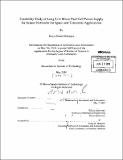| dc.contributor.advisor | Steven Dubowsky. | en_US |
| dc.contributor.author | Manyapu, Kavya Kamal | en_US |
| dc.contributor.other | Massachusetts Institute of Technology. Dept. of Aeronautics and Astronautics. | en_US |
| dc.date.accessioned | 2010-10-29T18:10:50Z | |
| dc.date.available | 2010-10-29T18:10:50Z | |
| dc.date.issued | 2010 | en_US |
| dc.identifier.uri | http://hdl.handle.net/1721.1/59681 | |
| dc.description | Thesis (S.M.)--Massachusetts Institute of Technology, Dept. of Aeronautics and Astronautics, June, 2010. | en_US |
| dc.description | "May 2010." Cataloged from PDF version of thesis. | en_US |
| dc.description | Includes bibliographical references (p. 87-90). | en_US |
| dc.description.abstract | Sensor networks used for activities like border security, search and rescue, planetary exploration, commonly operate in harsh environments for long durations, where human supervision is minimal. A major challenge confronting such devices is providing adequate and reliable power supply required for long durations. This research considers the feasibility of a miniature Proton Exchange Membrane (PEM) fuel cell system coupled with battery to supply power for long life missions. The focus of this research is to prove the feasibility of long-life, self-contained power-supplies using miniature fuel cells for low-power distributed sensor networks. In this research, the performance of fuel cell power-supplies weighing not more than a few hundred grams is studied. The performance of the PEM fuel cell is modeled, analyzed and validated using experimental results. The feasibility of the fuel cell power systems are studied for two reference missions - one on the lunar surface and the other in the desert regions of Negev, Israel. This research analyzes the use of passive methods to achieve thermal, air and water management for PEM fuel cells supplying power to these field sensors. The results of this study suggest that the proposed fuel cell power system is capable of providing power to sensor modules in challenging field conditions with operational lives extending from many months to years. The scope of this concept can be extended to power devices such as micro-robots and small unmanned aerial vehicles operating in extreme environmental conditions for sustained periods of time. | en_US |
| dc.description.statementofresponsibility | by Kavya Kamal Manyapu. | en_US |
| dc.format.extent | 98 p. | en_US |
| dc.language.iso | eng | en_US |
| dc.publisher | Massachusetts Institute of Technology | en_US |
| dc.rights | M.I.T. theses are protected by
copyright. They may be viewed from this source for any purpose, but
reproduction or distribution in any format is prohibited without written
permission. See provided URL for inquiries about permission. | en_US |
| dc.rights.uri | http://dspace.mit.edu/handle/1721.1/7582 | en_US |
| dc.subject | Aeronautics and Astronautics. | en_US |
| dc.title | Feasibility study of long-life micro fuel cell power supply for sensor networks for space and terrestrial applications | en_US |
| dc.type | Thesis | en_US |
| dc.description.degree | S.M. | en_US |
| dc.contributor.department | Massachusetts Institute of Technology. Department of Aeronautics and Astronautics | |
| dc.identifier.oclc | 668231339 | en_US |
